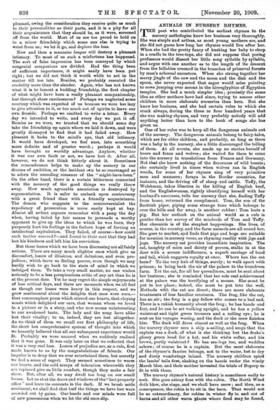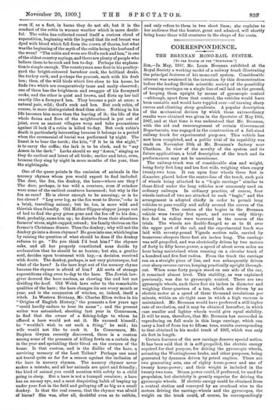ANIMALS IN NURSERY RHYMES.
Titpoet who contributed the earliest rhymes to the irsery anthologies knew her business very thoroughly. She was simple and artless, as most young mothers are, and she did not guess how long her rhymes would live after her. When she bad the pretty fancy of hushing her baby to sleep in a cradle in the tree-tops, she did not suppose that poring professors would dissect her little song syllable by syllable, and argue with one another as to the length of its descent from the lullabies crooned in the branches of primeval forests by man's arboreal ancestors. When she strung together her merry jingle of the cow and the moon and the dish and the spoon, she never expected that sages would arise pointing to cows jumping over moons in the hieroglyphics of Egyptian temples. She had a much simpler idea ; precisely the same idea as other mothers have had since, trying to amuse other children in more elaborate nurseries than hers. But she knew her business, and she had certain relies to which she stuck always, during the three or four hundred years that she vs making rhymes, and very probably nobody will add anything better than hers to the book of songs she has given us.
One of her rules was to keep all the dangerous animals out of the nursery. The dangerous animals belong to fairy-tales, which are for older children, and probably, so long as there was a baby in the nursery, she a little discouraged the telling of them. At all events, she made up no stories herself of bears and foxes and wolves ; she waited for them to come into the nursery in translations from France and Germany. Not that she knew nothing of the fierceness of wild beasts; she certainly lived in times when wolves ran in English woods, for some of her rhymes sing of very primitive men and manners; forays in the Border countries, for instance, and the driving off of sheep and cattle. Taffy, the Welshman, takes liberties in the killing of English beef, and the Englishwoman, rightly identifying herself with her husband's successes, tells her nursery that she, finding Taffy from home, returned the compliment. Tom, the son of the Scottish piper, piping some strange tune which belongs to over the hills and far away, is another robber : Tom loots a pig. But her outlook on the animal world as a rule is gentler than her survey of the misdeeds of Tom and Taffy. Her chronicle is of the simplest happenings. She lives, of course, in the country, and the farm animals are all round her. She goes to market, and finds that pigs and hogs are suitable for mention in nursery verse, as rhyming readily with jigs and jogs. The nursery cat provides immediate inspiration. The cat, haughty of mien and dainty of person, stalks in at the door with a serene indifference, a superb carriage of head and tail, which suggests royalty at once. Where has the cat been P To the very hub of things, surely ; to walk apart with princes ; to bring back the air of the palace to the humdrum farm. Yet the cat, for all her queenliness, must be sent about her business ; she is reminded that her sole real achievement at the palace was the terrifying of a mouse. She must be put in her place ; indeed, she must be put into the well. Methods with the cat are direct; there are more elaborate treatments of less familiar creatures. The frog, like the cat, has an air; the frog is a gay fellow who comes to a bad end. There is a rakish humanity about the frog ; he has hands and feet, and he can be set walking upright, and he has a yellow waistcoat and tight green trousers and a rolling eye ; he is sent on his voyages wooing, and the duck or the crow finishes him. The duck will dress almost as well as the frog. When the nursery rhymer sees a ship a-sailing, and sings that the captain was a duck, of what is she thinking but the drake's glossy green head for a hat, and his white collar, and his brown, portly waistcoat P He has sea-legs too, and waddles ashore ; of course he is a captain. But the most elaborate of the rhymer's fancies belongs, not to the water, but to dry and dusty wanderings inland. The nursery children spied the lambs' tails tint, shaking on the hazels under the windy March blue, and their mother invented the trials of Bopeep to fit in with them.
The nursery rhymer's natural history is sometimes sadly to seek. She goes astray first with the robin. The North Wind cloth blow, she sings, and we shall have snow; and them, as a consequence, the robin is to sit in the harm. That would not be so extraordinary, for robins in winter ity in and out of barns and all other warm places where food naayire found, even if, as a fact, in barns they do not sit; but it is the conduct of the robin in warmer weather which is more doubt- ful. The robin has collected round itself a curious cloud of superstition, beginning with the legend that its red breast was dyed with blood which fell from the crown of thorns, but what was the beginning of the myth of the robin being the husband of the wren? "The robin and wren are God's cock and hen," is one of the oldest country sayings, and there are plenty of people who believe them to be cock and hen to-day. Perhaps the explana- tion is simple enough. The countryman sees first in his poultry- yard the bright-coloured barndoor cock, the brilliant drake, the turkey cock, and perhaps the peacook, each with his drab hen; then, of the wild birds which live close to his house, he finds two which are comparatively tame and easily observed ; one of them has the brightness and swagger of his farmyard cocks, and the other is quiet and brown, and flirts up her tail exactly like a farmyard hen. They become a pair at once; a natural pair, wild ; God's cock and hen. But cock robin, of course, is more distinguished dead than alive. Nothing in his life becomes him more than the leaving of it; the life of the whole fauna and flora of the neighbourhood is put out of joint, even as ancient villagers weep and take precautions against ill luck if a robin is killed to-day. But cock robin's death is particularly interesting because it belongs to a period when the ceremonial of burial was performed by night. The linnet is to bear the torch ; the kite, "if it be in the night," is to carry the coffin; the lark is to be clerk, and to "say Amen in the dark." Larks should so say "Amen," singing as they do earliest and latest of all birds ; earlier and later, even, because they sing by night in more months of the year, than the nightingale.
One of the queer points is the omission of animals in the nursery rhymes whom you would expect to find included. The deer, the fox, the donkey, the hare—where are they ? The deer, perhaps, is too wild a creature, even if reindeer were some of the earliest creatures harnessed; but why is the fox so rare ? He is clever enough to be amusing; or is he too clever ? "Leg over leg, as the fox went to Dover,"—he is a brisk, travelling animal; but be, too, is more wild and thievish than friendly. Old Mother Slipper-slopper jumps out of bed to find the grey gcrose gone and the fox off to his den ; that, probably, sums him up ; he disturbs from their slumbers farmers' wives, night-capped, rotund ; his family thrives on the farmer's Christmas dinner. Then the donkey; why will not the donkey go into a dozen rhymes ? He goes into one, which begins by raising the question of what should be done if the donkey refuses to go. "Do you think I'd beat him? " the rhymer asks, and all her properly constituted sons decide by acclamation that he should be so beaten; but she, a gentler soul, decides upon treatment with hay,—a decision received with doubt. The donkey, perhaps, is not very picturesque, but what of the hare ? Is the hare kept out of the nursery rhyme because the rhymer is afraid of him ? All sorts of strange superstitions cling even to-day to the hare. The Jewish law- giver decreed the hare unclean, as chewing the cud but not dividing the hoof. Old Welsh laws refer to the remarkable qualities of the hare ; the bare changes its sex every month or year, and is the companion of witches, or, indeed, itself a witch. In Western Brittany, Mr. Charles Elton writes in his " Origins of English History," the peasants a few years ago "could hardly endure to hear its name " ; and the present writer was astonished, shooting last year in Connemara, to find that the owner of a fishing-lodge to whom he offered a hare would not eat it. He excused himself ; he "wouldn't wish to eat such a thing," he said ; his wife would not like to cook it. In Connemara, Mr. Stephen Gwynn recently discovered, there is a custom among some of the peasants of killing fowls on a certain day in the year and sprinkling their blood on the corners of the house. Is that custom, and is the dislike of the hare, a surviving memory of the Lost Tribes P Perhaps one need not travel quite so far for a reason against the inclusion of the hare in nursery rhymes. The nursery rhymer never makes a mistake, and all her animals are quiet and friendly ; the kind of animal you could mention with safety to a child going to sleep. But a hare is not a tranquil creature; a hare has an uneasy eye, and a most disquieting habit of leaping up under your feet in the field and galloping off as big as a small donkey. Is that the real reason, that the rhymer was afraid of hares P She was, after all, doubtful "even as to rabbits,
and only refers to them in two short lines; she explains to her audience that the hunter, great and admired, will shortly bring home these wild creatures in the shape of fur coats.

























































 Previous page
Previous page